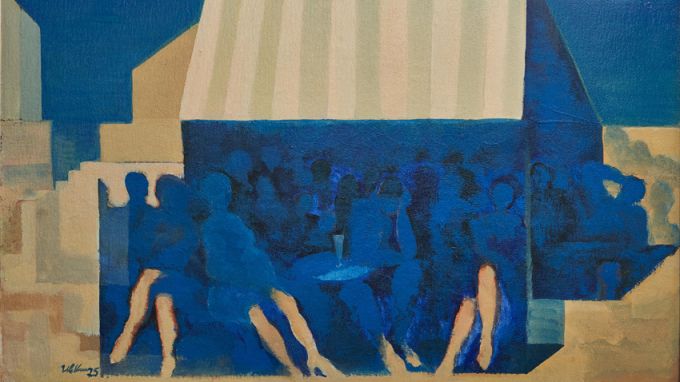 12
12
The Afternoon of an Ideology is the name of an exhibition which presents the recent past of this country in The Other Eye series. It is under the initiative of the Sofia City Art Gallery. The gallery invites every third year non-artist intellectuals, acquaints them with the abundance and variety of its art and presents art as seen through the eyes of the non-artist curators. Former chairman of the Council for Electronic media Georgi Lozanov and celebrated Bulgarian writer Georgi Gospodinov were invited to make their own projects there. It took them one whole year to go through the entire fund of the art gallery and present their own topic. That is how The Afternoon of an Ideology was born. Here is what the curator of the Sofia City art Gallery Adelina Fileva told Radio Bulgaria:
“Our purpose was to feature everything that happens after the end of the working day. Unlike the socialist period which featured the working man, the Afternoon of an Ideology exhibition pays attention to the tired people. Georgi Lozanov and Georgi Gospodinov chose several topics: public transport, the atmosphere of the city, its lifestyle, holidays and entertainment. They also chose the childhood topic and answer the question how people spend their time after work when they feel tired. Several paintings by Petar Dochev and Vihroni Popnedelev placed on the central wall of the gallery depict travelling people. The personalities on those pictures look very tired and sleepy. Meanwhile, some of the works displayed at the exhibition feature holidays, but the people on the paintings do not look joyful at all and exhaustion can be clearly seen on their faces.”
Adelina Fileva notes that the Sofia City Art Gallery collects each year projects of people employed at the gallery, as well as other proposals. The artistic council gets acquainted with all projects and decides how the art gallery should arrange its programme and what to present to the audience.
“The exhibitions displayed at the gallery in 2016 and 2015 feature the recent past. We displayed an exposition of art critic Maria Vasileva who was a curator of the Art for Change 1985-2015 exhibition. Krasimir Iliev presented his Forms of Resistance 1944-1985 project. We also featured a project for contemporary art. In fact, those three initiatives have three different points of view about the period preceding socialism and the first years of socialism. I don't know yet whether the gallery will have initiatives related to the recent past in 2017. Perhaps our course will be different from what we have presented so far, because those projects require special study when they are related to history. It means that we have to study the archives in details and collect a lot of documents, in order to back the creative process with history and see what is behind those works of art.”
The exhibition also features Georgi Gospodinov's and Georgi Lozanov's personal experience. The topic of that exhibition was not popular in the socialist period, because no one liked to watch exhausted people, Adelina Fileva further said. The Sofia City Art Gallery is expected to deal with research projects in the future, but perhaps those projects would not be related to politics and the recent past.
English version: Kostadin Atanasov
Bulgarians from 18 countries, 34 schools abroad, and 8 Bulgarian lecturers from universities abroad are the participants in the first year of the "Untold Stories of the Bulgarians" National Program, which seeks out little-known facts..
A colorful graffiti mural, created in connection with the 20th anniversary of Bulgaria's membership in NATO, was unveiled in Blagoevgrad (Southwestern Bulgaria). The street-art work can be seen at 65 Slavyanska Street. It was realized with the..
Over 100 films and various discussions on current issues await those who seek a first-hand account of events in Ukraine at the fifth edition of ОКО - International Ethnographic Film Festival. For the first time, the festival is a Ukrainian-Bulgarian..
The fourth national Biennial of Illustrations opens today in the triangular tower of Serdica, part of the Regional Museum of History in Sofia. As..

+359 2 9336 661
